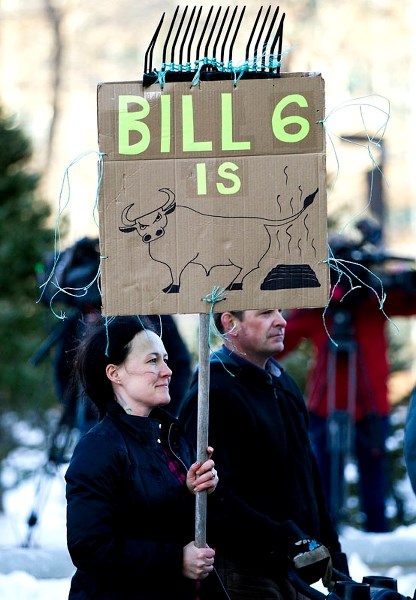It took Matthaeus Grubenmann five years of raising and selling pigs to save enough money to buy his own tractor.
The 12-year-old cuts, mows, rakes and bales his family’s 480-acre farm in Breton, a mainly agricultural community located southwest of Edmonton.
He worries that under new sweeping farm safety legislation put forward by the NDP he won’t be able to help out around the farm in this way anymore.
This would be hard for Matthaeus, a farm kid who loves nothing more than to talk about machinery and soil composition. And especially hard for the family.
Since losing his father in June, Matthaeus’ contributions have been essential to daily operations.
“It takes two people to feed cattle. It takes two people to do most jobs on the farm,” said his mom, Dallas Grubenmann. “If he can’t help me, we’re not sure what we’re going to do.”
There has been a lot of uncertainty about how Bill 6, Enhanced Protection for Farm and Ranch Workers Act, will affect family farms.
Does Neil Trautman’s mother have to undergo safety training when she’s been running a tractor for longer than many of the politicians who are pushing the bill have been alive?
Will Brad Javorski’s 81-year-old grandmother have to wear a hardhat, steel-toed boots and a reflective vest while she delivers lunch to the canola fields in Onoway?
But the biggest worry voiced on the steps of the Alberta legislature during a protest Friday afternoon, is that the bill, which removes farm and ranch exemptions from four pieces of existing labour legislation, will hinder farm kids’ practical education and kill the community spirit.
Would new Occupational Health and Safety (OHS) legislation prohibit neighbours from helping neighbours – outlawing annual cattle drives or acts of kindness? Will the new Employment Standards allow Matthaeus to care for pigs or his younger sisters to tend to their hens?
“My girls, they look after the chickens and sell the eggs. That’s how they earn money. They talk to their own customers; they have their own clients,” said Dallas.
The concerns prompted a statement from the Minister of Jobs, Skills, Training and Labour, Lori Sigurdson, who assured the public that 4-H programs would remain intact and that neighbours and relatives would continue to help each other out in times of need – only now they would be protected as unpaid workers under OHS.
“These customary parts of farm life will go on as before, while enhancing protections for employees,” said Sigurdson. “Our legislation allows us the flexibility to develop common-sense regulations to achieve this goal. That is what we have started consulting on. And that is what we will ensure is achieved before the regulations are introduced.”
While many of the details – OHS technical rules, potential employment standard and labour relations exemptions to account for harvest season, specification of duties that can be performed by children under the age of 12 – have yet to be worked out in consultation with farmers, producers, industry associations and the public, many feel that this approach is like leading the cow by the rear end.
If the bill passes, Workers’ Compensation Board coverage will be mandatory as of Jan. 1, 2016. Occupational Health and Safety Legislation will also come into effect at this date, although the technical requirements won’t be introduced until 2017.
Amendments to the Employment Standards Code and the Labour Relations Code will be introduced in the spring, to allow for the province to work with industry to come up with possible exemptions.
The province is collecting public feedback until the new year through in-person and online submissions.
A public consultation session for the Edmonton region will be held in Leduc on Monday, Dec. 7 from 1 p.m. to 4 p.m. at the Best Western Plus Denham Inn & Suites. The session is full, but names are being added to the waitlist and new sessions are being added to the schedule.
A survey will also be available online until Jan. 3, 2016. Comments can be sent via email to [email protected].




